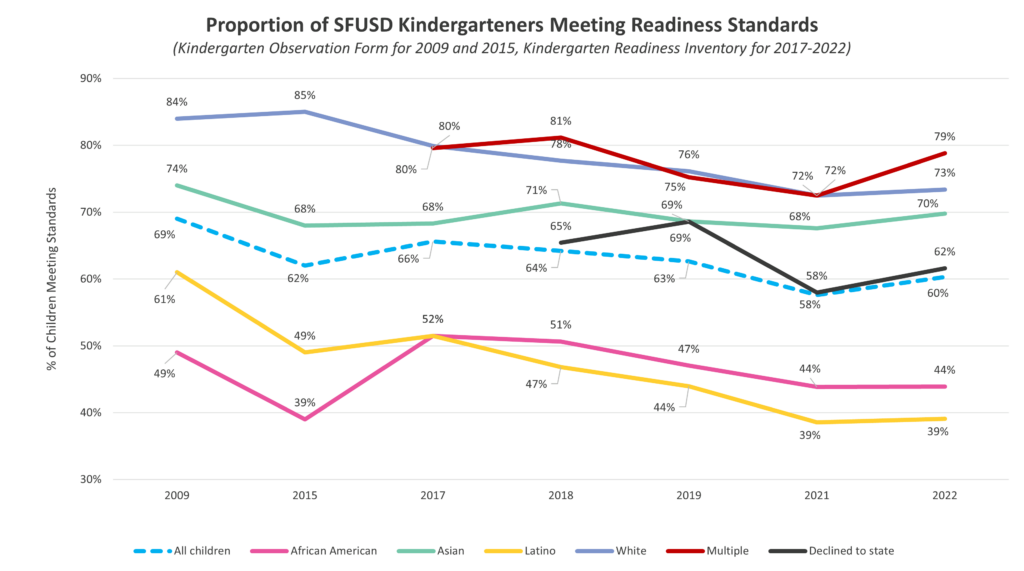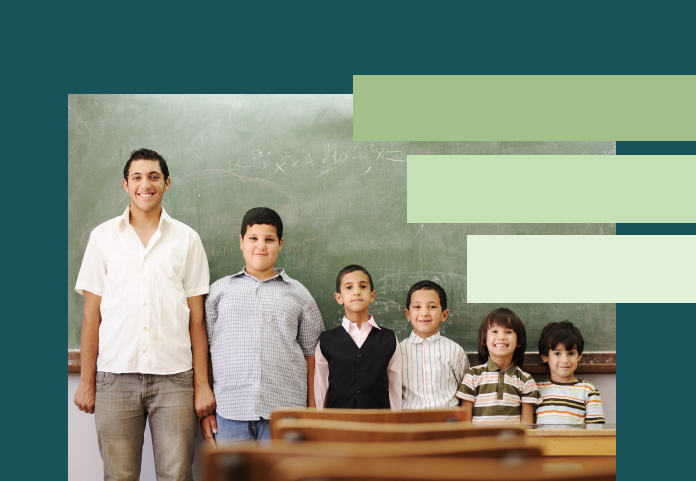A new study that followed San Francisco Unified School District students from the time they entered kindergarten until they turned eighteen, demonstrates the critical importance of investing in children and families during their first five years. The study found that those students who performed well on measures of “kindergarten readiness” when they were five, consistently performed better on later measures of academic success including 3rd grade math and language arts test scores, middle school math scores, middle school GPA, high school GPA, and on-time graduation rates. Conversely, those students who were only partially ready or not ready according to kindergarten assessment, had consistently lower test scores, lower GPAs, and higher suspension and drop-out rates.
Background
For decades, early childhood practitioners and researchers have extolled the societal benefits of investing in services that support the healthy cognitive, physical, and social-emotional development of children prenatal to five. In his ground-breaking work with a consortium of economists, psychologists, statisticians and neuroscientists, Professor James Heckman demonstrated that investment in early childhood development directly influences economic, health and social outcomes for individuals and society. However, some debate remains as to whether the impact of preschool – and kindergarten readiness – is sustained over time, as long-term follow-up studies are few.
Methodology
In 2009, DEC’s predecessors at First 5 San Francisco, in partnership with the San Francisco Unified School District (SFUSD), funded research to assess the first representative sample of entering kindergarten students’ preparedness for school. Kindergarten teachers were trained to complete a Kindergarten Observation Form (KOF) that assessed the academics, self-regulation, social expression, self-care and motor skills of each child in their classroom during the first few weeks of the 2009 school year.

Then, in 2022, when most of the 2009 kindergarten cohort would have graduated from high school, DEC contracted with a research consultant to conduct a retrospective longitudinal study of the relationship between kindergarten readiness and long-term school outcomes. Because district student identification numbers were recorded on the 2009 readiness assessments, information about these students’ academic journeys over the ensuing 12 years could be linked, providing a unique opportunity to examine the trajectories of the 2009 cohort and relate outcomes to their school readiness at kindergarten entry.
Findings
In short, this study finds that school readiness matters. Not only are children better prepared for school when they have developed the foundational skills that will support their kindergarten success, but school readiness accrues benefits through to high school graduation in a variety of ways. The more ready a child was in kindergarten, the higher their performance on standardized English Language Arts (ELA) and Mathematics tests in third grade and through later years. Significant effects of school readiness in kindergarten were found on middle school grade point average, even after controlling for many sociodemographic and school factors. Moreover, students who were fully ready to start school in kindergarten were more likely to graduate high school on time. Though all children’s test scores improved over time, their relative standing in comparison to their classmates did not change. In other words, those who were only partially kindergarten ready or not ready never caught up to their peers who were fully ready.

This is why kindergarten readiness matters. Because it is exceedingly unlikely for a student who is only partially ready or not ready for kindergarten to ever catch up to K-ready peers, the best intervention is to provide the necessary supports before children enter the SFUSD K-12 system so that all children start school ready to succeed.
Racial Equity
While the study carefully controlled for sociodemographic factors including gender, race/ethnicity, family income, and more to ensure that kindergarten readiness was directly associated with academic achievement and that differences in outcomes were not just a byproduct of demographic differences between readiness groups, we know that there are significant differences in the demographics of those who are fully ready and those who are not. Unfortunately, structural racism actively prevents Black, Latino, Pacific Islander and Indigenous children and families from accessing the resources, programs, and services that contribute to kindergarten readiness.

The longitudinal study findings, taken in tandem with persistent racial disparities in kindergarten readiness, illustrate that the only way to close racialized academic achievement gaps is to apply a racial equity lens to early childhood investment.
To learn more, download the Full Research Report.
If you have questions on this study or would like DEC to present findings to your policy body, conference, or organization, please contact sfdec@sfgov.org.

